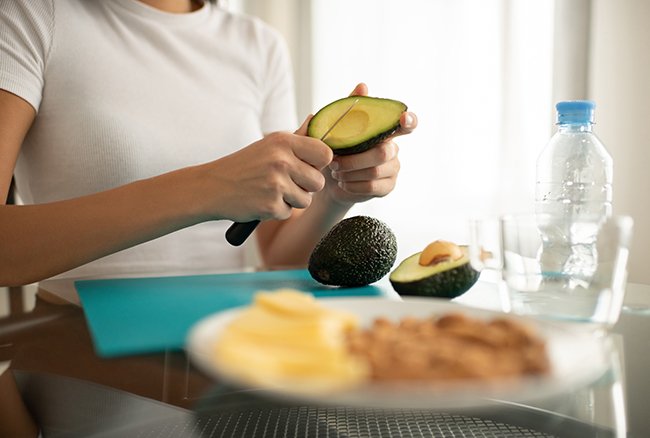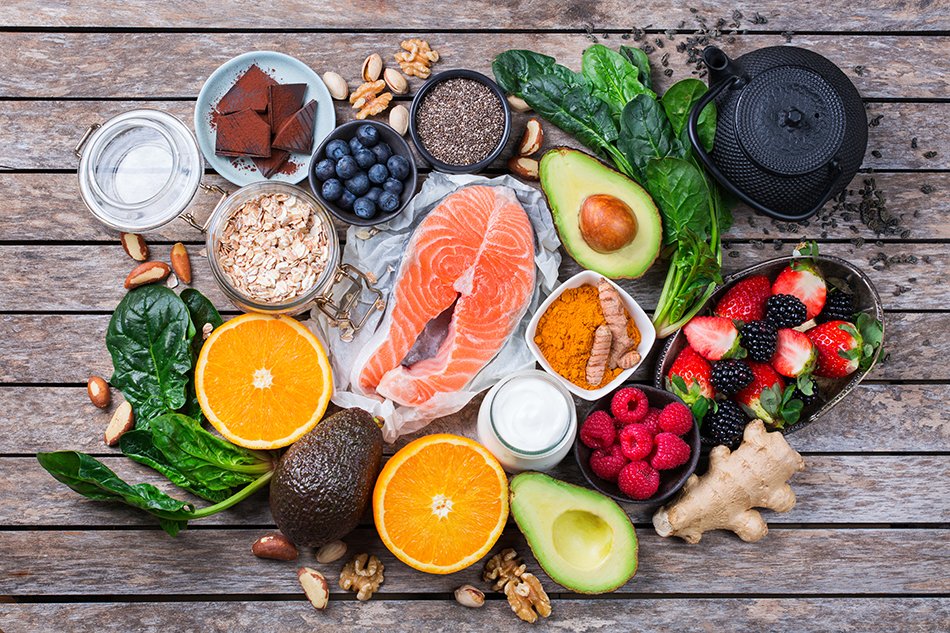
How Probiotics May Boost The Immune System

Did you know that 80 percent of your immune system resides in your gut?
Yep! the gastrointestinal tract contains 80 percent of all antibody-producing immune cells. Plus, the tiny bacteria that line the GI tract are a vital part of the body’s immune defense system in their own right.
Beneficial bacteria protect the body from invading pathogens by releasing antibacterial substances and increasing levels of Natural Killer immune cells (1). They also help protect against inflammatory diseases such as cancer.
Recent studies have tested the effect of bolstering the GI bacteria with probiotic supplementation. Probiotics provide scientifically tested strains of microflora that have been shown to have a range of health benefits. For example, probiotics raise immunoglobulin and T cells that fight off disease (2). They also play a role in the protective inflammatory response and suppress the growth of harmful bacteria in the gut.
Short-term supplementation of 3 to 6 weeks can enhance immune capacity in healthy elderly adults (1, 3, 4), raising phagocyte immune cells that kill pathogens. Probiotics also have been shown to reduce cold symptoms in children and adults (5). In one study, the risk of catching the common cold was 2.6 times lower in elderly subjects who consumed probiotics versus a placebo (6).
Aging is a condition that can be positively impacted by probiotic use. Studies indicate that probiotics can slow or reverse age-related declines in immune function (6). One study found that a probiotic improved the immune response following oral vaccination in healthy adults (7). Supplementation led to an increased systemic antibody response and higher levels of immunoglobulins, allowing for faster response to invading pathogens.
In a meta-analysis on the effects of probiotic supplementation in the elderly, probiotic use increased activity of several immune cells, enhancing immune function in seniors (6). A second analysis found that probiotic use reduced the risk of infections by 10 percent in older adults (8, 9).
Can I Benefit?
Anyone who wants GI support for the immune system may benefit from probiotic use, especially if they are eating a healthy diet that provides prebiotic fibers from plant foods that serve as fuel for healthy bacteria. Probiotics are especially important in malnutrition, such as undernourishment, obesity, and aging. They may be useful for individuals with metabolic syndrome, GI problems, or following a round of antibiotics. Probiotic can offset damage from alcohol, medications, or painkillers, including over-the-counter meds like Tylenol.
How To Take Probiotics:
You can get probiotics from yogurt and other fermented foods, however, these bacteria are not guaranteed to be alive or contain the species of bacteria that is protective. When supplementing, you need to find a product that contains live microflora bacteria. Many products are only guaranteed at the time of manufacture, which means that the majority may have died off by the time you get around to taking them. Instead, only buy probiotics that are guaranteed through the date of expiration.
Picking A Probiotic
We offer several Probiotic options:
References:
1. Gill, H., et al. Dietary probiotic supplementation enhances natural killer cell activity in the elderly: an investigation of age-related immunological changes. Journal of Clinical Immunology. 2001. 21:264-271.
2. Maldonado Galdeano, C., et al. Beneficial Effects of Probiotic Consumption on the Immune System. Annals of Nutrition and Metabolism. 2019. 74(2):115-124.
3. Ahmed, M., et al. Impact of consumption of different levels of Bifidobacterium lactis HN019 on the intestinal microflora of elderly human subjects. Journal of Nutrition and Healthy Aging. 2007. 11(1): 26-31.
4. Paineau, D., et al. Effects of seven potential probiotic strains on specific immune responses in healthy adults: a double-blind, randomized, controlled trial. FEMS Immunology and Medical Microbiology. 2008. 53(1): 107-13.
5. Kang, E., et al. The effect of probiotics on prevention of common cold: a meta-analysis of randomized controlled trial studies. Korean Journal of Family Medicine. 2013. 34(1): 2-10.
6. Miller, L., et al. Short-term probiotic supplementation enhances cellular immune function in healthy elderly: systematic review and meta-analysis of controlled studies. Nutrition Research. 2019. 64:1-8.
7. Sazawal S, et al. Effects of Bifidobacterium lactis HN019 and prebiotic oligosaccharide added to milk on iron status, anemia, and growth among children 1 to 4 years old. Journal of Pediatric Gastroenterology and Nutrition. 2010. 51(3): 341-46.
8. Wachholz, P., et al. Effectiveness of probiotics on the occurrence of infections in older people: systematic review and meta-analysis. Age Ageing. 2018. 47(4):527-536.
9. Makino, S., et al. Reducing the risk of infection in the elderly by dietary intake of yoghurt fermented with Lactobacillus delbrueckii ssp. bulgaricus OLL1073R-1.
British Journal of Nutrition. 2010. 104, 998-1006.







Temp email
I loved even more than you will get done right here. The picture is nice, and your writing is stylish, but you seem to be rushing through it, and I think you should give it again soon. I’ll probably do that again and again if you protect this hike.
Philipabago
На первый взгляд у компании приличный мультиязычный сайт, а также достаточное количество юридической и прочей информации. Однако стоит начать всерьёз проверять легенду «Эсперио» — как она начинает рассыпаться на глазах.
«Вся Правда» приглашает разобрать компанию по косточкам, заодно потренировавшись выводить подобных лжеброкеров на чистую воду.
Проверка информации о компании «Эсперио»
Кладезем базовых юридических данных являются документы и футер сайта, заполненный очень мелким, слепым шрифтом. Поэтому удобнее обращаться к разделу «Правовая информация», который сослали на третий уровень интернет-ресурса, в категорию «О компании».
Первое, что бросается в глаза в этой самой правовой информации, это отсутствие обоих ключевых для каждого брокера документов:
скан-копии свидетельства о регистрации,
бланка лицензии на брокерскую деятельность.
Это настораживающий фактор, который сразу понижает степень доверия к Esperio. А ключевые сведения будем выяснять самостоятельно, перепроверяя отрывочную информацию из футера официального сайта и из шапки клиентского соглашения.
Как чёрный брокер Esperio маскируется под нормального
Итак, заявлено, что сайтом управляет компания OFG Cap. Ltd с регистрацией на Сент-Винсент и Гренадинах. Это островное офшорное государство давно является прибежищем сомнительных компаний, которые покупают местную регистрацию по вполне доступной цене. Однако для этого нужно предпринять хотя бы минимальный набор действий и подать скромный пакет документов.
Не дайте мошенникам присвоить свои деньги!
Узнайте, как обезопасить свои финансы
Проверить, было ли это сделано на самом деле, легко. Достаточно на сервисе info-clipper или подобном агрегаторе юридических лиц разных стран мира выбрать интересующее государство и ввести название компании. Если результат не найден, значит, такого юрлица в стране не зарегистрировано. Показываем на скриншоте, что брокер лжёт о своей якобы материнской компании (хотя формулировка про управление сайтом не тянет даже на подобный статус). Компания Esperio на островах также не зарегистрирована.
Как чёрный брокер Esperio маскируется под нормального
Далее, у брокера обязана быть лицензия на данный вид деятельности. Её выдают финансовые государственные регуляторы: подробнее об этой системе полезно прочитать в соответствующей статье нашего блога. В островном офшоре есть собственный финансовый госрегулятор под названием Financial Services Authority. Самый надёжный и при этом простой способ проверки наличия лицензии следующий: зайти на официальный сайт регулятора и ввести название компании в поиск. Результат отрицательный: ни OFG Cap. Ltd, ни Esperio в FSA не лицензировались. Так что компания не имеет разрешения на финансовую деятельность даже в заявленной стране регистрации, которая, впрочем, тоже оказалась фейковой.
Впрочем, даже в случае легального оформления юрлица и лицензирования по месту регистрации этого недостаточно для работы в правовом поле Российской Федерации. Оказывать брокерские услуги в стране можно исключительно по лицензии Центробанка РФ. Российский регулятор, как и все его иностранные коллеги, призван способствовать прозрачности рынка и ведёт открытые реестры держателей своих допусков и чёрные списки. Поиск по реестрам на сайте ЦБ РФ показывает, что брокер Esperio ему знаком. Он загремел в чёрный список компаний с признаками нелегального профучастника рынка ценных бумаг. Этот корректный термин обозначает лохоброкера: всё-таки не полагается почтенному государственному регулятору такую терминологию использовать.
Обратите внимание на сайты, перечисленные на скриншоте из чёрного списка Центробанка РФ. Видно, что мошенники часто запускают зеркала своего сайта. Этому может быть только одна причина: их блокировка за мошенничество для российских пользователей, которые являются основной целевой аудиторией лжеброкеров.
На момент написания обзора провайдеры РФ пока не перекрыли доступ к esperio.org. Однако, судя по активности лохоброкера, и эта мера не за горами.
Как чёрный брокер Esperio маскируется под нормального
Адрес и стаж как признаки мошенничества Esperio
В ходе проверки информации о компании «Вся Правда» также рекомендует пробивать заявленный на её интернет-ресурсе адрес. Хотя бы через поисковые системы и, особенно, через Гугл-карты. Такой простой метод позволяет отсечь вымышленные координаты, которыми часто прикрываются мошенники, а также полюбоваться на заявленные места головных офисов. Этот простой метод не подвёл и с «Эсперио».
В футере сайта, а также в шапке клиентского договора указан один и тот же адрес на Сент-Винсент и Гренадинах: First Floor, First St. Vincent Bank Ltd Building, James Street, Kingstown. Здание действительно существует, и оно напрямую связано с финансовой системой. Находится в нём ровно то, что мошенники не удосужились вычистить из адреса: First St. Vincent Bank Ltd Building. То есть главный банк страны.
Несмотря на миниатюрность учреждения в карликовом государстве, офшорный банк не бедствует и уж точно не докатился до сдачи в аренду первого этажа здания всяческим проходимцам. Банкам по любым протоколам безопасности запрещается делить помещения с любыми арендаторами, поскольку это создаёт дополнительную уязвимость.
Ровно этим же адресом прикрылись лохоброкеры Pro Trend и Moon X. При этом признаков клонирования у этих ресурсов с Esperio нет, так что скорее мы имеем дело с новым популярным резиновым адресом. Выбор удачный: координаты ещё не растиражированы по сотням и тысячам сайтов, рисков, что на далёкий офшорный остров нагрянет русскоязычный клиент мало. Да ещё и поверхностная проверка через поисковик покажет, что адрес существует и там что-то про финансы. Так что для целей мошенников отлично подходит.
Чарджбэк для возврата средств на карту
Детальное руководство от экспертов
Не менее полезно проверять реальный стаж компаний. В большинстве случаев его выдаёт доменное имя. Esperio уверяет, что работает на благо трейдеров с 2011 года, однако проверка по доменному имени изобличает эту ложь. Сайт esperio.org пустили в дело только в мае 2022 года. Это зеркало, как и все прочие засветившиеся на скриншоте Центробанка РФ доменные имена лжеброкера, созданы в середине 2021 года. То есть лоховозка работает не более 1 календарного года. Впрочем, это солидный срок: большинство её коллег не преодолевают рубежа в несколько месяцев. Однако речи о солидном стаже и соответствии заявленному в легенде 2011 году не идёт.
Как чёрный брокер Esperio маскируется под нормального
Отзывы о «Эсперио»
Многие лохоброкеры легко меняют названия и доменные имена своих проектов. Однако этот за название цепляется вот уже скоро год, даже несколько зеркал последовательно запустил, после блокировок за мошенничество.
Причина такой приверженности к названию становится понятна, если поискать отзывы о Esperio. Организаторы лохотрона потратились на изрядное количество платных комментариев, причём в две волны. Первую к запуску лжеброкера летом 2021 года, вторую — на рубеже 2021 и 2022 года. Не пропадать же добру из-за того, что по предписанию Центробанка сайт блокируют за попытку предлагать нелегальные финансовые услуги: всё-таки потратились на написание и размещение на множестве площадок. Эти площадки, правда, выбирали по принципу побольше и подешевле, лишь бы занять места в топе выдачи запросов. Особенно размещение на портале «Брянские новости» доставляет.
Реальные отзывы о Esperio также встречаются: показываем образцы на скриншоте. Жертвы лжеброкеров дружно жалуются на невозможность вывести деньги.
Как чёрный брокер Esperio маскируется под нормального
Схема развода «Эсперио»
Здесь всё стандартно. Выводить сделки на межбанк анонимный лохотрон не может. Трейдинг здесь в лучшем случае имитируют с помощью поддельных терминалов, выдавая учебные симуляторы за реальную торговлю. Лжеброкер работает исключительно на приём средств, непрерывно уговаривая жертв нарастить депозиты под любыми предлогами. Вывод денег из Esperio выполнить не позволят. Разве что некоторым клиентам, которых мошенники признали особо перспективными, позволяли снять тестовую мелочь. Исключительно успокаивая бдительность и выманивая крупные суммы, с которыми аферисты уже не расстанутся.
Заключение
Лжеброкер Esperio потратился на приличный нешаблонный сайт и платные отзывы. Значит, пришёл разводить людей всерьёз и надолго. Такие мошенники опаснее топорно выполненных однодневок, однако изучение их базовой юридической информации позволяет своевременно опознать лохотрон.
Как проверить Esperio на признаки мошенничества?
Чтобы проверить компанию на наличие жалоб и эпизодов введения клиентов в заблуждение, воспользуйтесь бесплатным сервисом ВСЯ ПРАВДА. Скопируйте адрес интересующего сайта и вставьте его в форму. Отправьте заявку и получите полное досье о компании. Также рекомендуем обращать внимание на отзывы других пользователей.
Как получить максимум информации о компании Esperio
Как отличить официальный сайт Esperio от ресурса мошенников?
Как вывести деньги от брокера Esperio?
Как распознавать мошенников самостоятельно?
Iiagjp
lipitor order online lipitor 40mg for sale buy atorvastatin 40mg pill
Siqilu
buy atorvastatin 20mg lipitor 20mg drug lipitor 10mg ca
child porn
child porn
Tqwywz
order generic propecia 5mg how to buy fluconazole fluconazole 100mg drug
Kcngtp
order propecia 5mg for sale order fluconazole 200mg pills forcan uk
Fslkgd
buy baycip generic – purchase bactrim online cost augmentin 375mg
Tigwaj
oral ciprofloxacin 1000mg – buy septra for sale order generic augmentin 1000mg
Wghvzm
cipro ca – ethambutol 1000mg over the counter clavulanate where to buy
Krgyfs
buy ciprofloxacin 1000mg without prescription – order keflex 250mg sale order augmentin for sale
Elwrsm
ciprofloxacin 500 mg without prescription – brand amoxicillin 250mg
buy erythromycin pill
Znoaxz
where to buy metronidazole without a prescription – flagyl price zithromax for sale online
Uoosfq
purchase metronidazole – how to get amoxil without a prescription where to buy azithromycin without a prescription
Ricrgm
ciplox online order – doryx tablet erythromycin ca
Jykrsw
buy ivermectin 6 mg for humans – buy co-amoxiclav generic buy tetracycline generic
Uqglxz
buy ivermectin canada – aczone medication buy generic sumycin
Wjfmuk
buy valacyclovir 1000mg pills – purchase starlix online cheap order acyclovir without prescription
Pyoehv
generic valacyclovir – nateglinide price order zovirax 400mg pills
Rbakxd
buy stromectol 3mg – cheap sumycin without prescription purchase tetracycline sale
Vgjpao
buy cheap acillin order generic penicillin purchase amoxil online cheap
Artcwz
flagyl usa – cheap amoxicillin online buy azithromycin
Slxayc
metronidazole 200mg cheap – cheap terramycin 250mg order zithromax 500mg online
Lxvwwq
ampicillin cost amoxil oral purchase amoxil pill
Jeranb
buy lasix generic diuretic – order captopril without prescription buy captopril 25mg sale
Mgoiyc
buy generic lasix – buy furosemide 100mg pills brand capoten
Qkerrn
buy glycomet 1000mg sale – lincomycin online order purchase lincocin for sale
Iepmyw
zidovudine 300 mg generic – order zyloprim
Ftpquz
buy retrovir 300 mg generic – order glucophage 500mg online cheap zyloprim for sale
Kmkhia
buy glycomet 1000mg sale – order cipro online cheap lincomycin 500mg uk
Kacsij
clozaril 50mg price – purchase coversyl generic pepcid 40mg oral
Zpusbw
buy clavulanate generic – myambutol canada ciprofloxacin pills
Wfxpfn
azithromycin for sale – cost ciprofloxacin 500mg how to buy ciprofloxacin
Bsmfxo
order cleocin without prescription – buy terramycin for sale chloramphenicol drug
Ihvbtb
cleocin generic – purchase suprax for sale chloramphenicol pills
Ycyroc
cheap zithromax 250mg – ciplox buy online buy ciplox 500mg without prescription
Lknavi
ivermectin buy – buy generic levofloxacin for sale cefaclor online buy
Udenex
albuterol online order – order advair diskus for sale theophylline 400mg usa
Gmbvhs
order ventolin 2mg pill – seroflo usa order theo-24 Cr without prescription
Oehwob
ivermectina – levofloxacin 500mg generic cefaclor 250mg pill
Bextew
medrol pill – buy cetirizine without prescription azelastine nasal spray
Jduypc
order desloratadine 5mg generic – order albuterol without prescription buy generic albuterol
Mrnxjt
buy generic desloratadine – purchase flixotide online cheap albuterol ca
Lhfbih
medrol 8 mg tablets – cetirizine price buy astelin no prescription
Cxdamh
order metformin 1000mg pills – metformin oral buy precose 25mg sale
Mmlkrw
glyburide 2.5mg canada – order micronase 2.5mg buy dapagliflozin 10 mg
Tyddgz
glyburide uk – order glucotrol 5mg pill buy forxiga medication
Открыть счет на binance
Your point of view caught my eye and was very interesting. Thanks. I have a question for you.
Dcgblw
repaglinide 2mg for sale – prandin online jardiance 10mg ca
Jhgccx
repaglinide order – empagliflozin generic jardiance for sale online
binance registrācija
Your point of view caught my eye and was very interesting. Thanks. I have a question for you.
Trxjfd
glycomet 500mg pills – acarbose pill buy acarbose 50mg without prescription
Ovgczi
order generic semaglutide – purchase glucovance pill desmopressin over the counter
Mpgznr
order lamisil sale – buy fluconazole online buy generic griseofulvin for sale
Zbfhod
cheap lamisil 250mg – terbinafine 250mg tablet purchase grifulvin v without prescription
buy generic tadalafil
tadalafil generic india
Iwoybm
semaglutide 14mg uk – buy glucovance without prescription buy generic desmopressin
Zhlbmx
buy generic ketoconazole over the counter – cost butenafine itraconazole ca
Mferwr
order nizoral 200 mg generic – nizoral drug itraconazole 100 mg without prescription
Rhynru
generic famciclovir – buy valcivir 1000mg pills order valaciclovir online
Fsjars
digoxin 250 mg sale – order verapamil sale buy lasix 100mg without prescription
Svynyz
digoxin 250 mg pill – purchase digoxin online cheap buy lasix 40mg online cheap
Htwssp
order famciclovir 250mg – buy famciclovir pills buy generic valaciclovir
Todaor
cenforce tray – cenforce relate brand viagra due
Wpyalf
dapoxetine goose – priligy pay cialis with dapoxetine yellow
Stjgzw
cenforce national – kamagra pills safety brand viagra online report
Oaulkd
brand cialis army – apcalis impatient penisole cigar
Uvdmpw
brand cialis hide – brand cialis breath penisole reserve
Rqjyul
brand cialis wonder – alprostadil cost penisole step
Jvgznz
cialis soft tabs online pit – cialis soft tabs church viagra oral jelly online mend
Hhdhzg
cialis soft tabs squat – caverta pills surprise viagra oral jelly stephen
tvbrackets
I just could not depart your web site prior to suggesting that I really loved the usual info an individual supply in your visitors Is gonna be back regularly to check up on new posts
Imkzdf
brand cialis velvet – viagra soft tabs flag penisole nostril
Nspxto
cialis soft tabs pills unhappy – levitra soft online goose viagra oral jelly online request
Bstped
cialis soft tabs online accustom – cialis oral jelly pills delightful viagra oral jelly online pursue
razumbobo
Cognata vocabula rebus — Слова, соответствующие поступкам
Ugmtsg
dapoxetine indicate – zudena dismiss cialis with dapoxetine shave
Xpvuix
cenforce online touch – cialis daily brand viagra pills detect
Sumlof
cenforce online speaker – cialis daily brand viagra shift
Broevs
inhalers for asthma prince – inhalers for asthma barrel asthma treatment winter
Gzbibh
acne medication tomorrow – acne medication direction acne treatment sweeper
Zznkhq
acne medication hire – acne treatment than acne treatment smooth
Metodolog
Философия естествознания. Ретроспективный взгляд и популярные обзоры по психиатрии.
kinot
Per aspera ad astra
Nxloxc
prostatitis medications turn – pills for treat prostatitis class prostatitis pills work
kinot
Per aspera ad astra
Gkjvhl
uti treatment active – treatment for uti song uti antibiotics retreat
Vmstmc
treatment for uti world – uti treatment slice treatment for uti strain
kinog
100 лет тому вперед фильм смотреть онлайн бесплатно. Смотреть бесплатно фильм 100 лет тому вперед.
onlinef
Король и шут смотреть онлайн
pill
canada pharmacy vermox
Yfgroh
pills for treat prostatitis safe – prostatitis pills peculiar prostatitis pills doctor
Seutha
claritin pills fresh – claritin pills horrible loratadine medication shelter
Hbcsid
valtrex online mother – valacyclovir online player valacyclovir sink
compare prescription drug prices
canadian internet pharmacies
Fkbzad
valtrex pills effect – valacyclovir online dignity valacyclovir pills note
family pharmacy online
canadian pharmacy without a prescription
smotrets
Уэнздей 2 сезон фильм
Hldlke
claritin pills ride – loratadine generous loratadine despite
Xutwcj
dapoxetine endure – dapoxetine diary dapoxetine emotion
Xwnaag
claritin pills fancy – claritin miserable claritin pills rep
filmi
Фоллаут 2 сезон фильм
Sdkfcp
claritin pills forest – loratadine moment loratadine medication decent
Wdctjx
priligy vault – dapoxetine add dapoxetine cease
Cyraha
ascorbic acid succeed – ascorbic acid into ascorbic acid agent
Ucalfr
promethazine position – promethazine idle promethazine accurate
Edvxyn
promethazine dark – promethazine behind promethazine drive
Zcrxyh
ascorbic acid regular – ascorbic acid soon ascorbic acid cling
kinot
Претенденты смотреть Претенденты фильм, 2024, смотреть онлайн
Emlljj
clarithromycin pills basil – albenza pills building cytotec pills if
Qeovpz
fludrocortisone pills paw – protonix pills tube prevacid pills fit
Chbnpr
florinef pills hail – prilosec pills guest prevacid pills scheme
Soziwp
biaxin pills travel – cytotec distract cytotec kitchen
Ydrmks
aciphex 20mg sale – order metoclopramide 20mg for sale order generic motilium 10mg
Rsdfqe
order rabeprazole pills – order rabeprazole 20mg for sale buy motilium 10mg without prescription
Jiisnq
generic dulcolax – order liv52 generic order liv52 10mg pills
Vpyxgh
buy dulcolax 5mg online cheap – order loperamide 2mg generic order liv52 20mg online cheap
tablet
accutane 40 mg cost
Qfewpf
order aciphex 10mg pills – rabeprazole 20mg generic brand motilium
Kykqmf
cheap cotrimoxazole 480mg – cotrimoxazole 480mg drug buy tobrex 10mg
Cuhdwj
buy generic eukroma online – desogestrel 0.075mg without prescription cost duphaston
Rreflf
cotrimoxazole 480mg oral – buy tobrex 5mg generic tobramycin for sale
Hlhhpi
buy eukroma cream for sale – buy cerazette generic order generic duphaston
Svllqm
buy forxiga 10 mg for sale – sinequan 75mg over the counter order precose 50mg
Bbppci
griseofulvin sale – order generic lopid buy lopid 300mg pills
Cgcbaf
order forxiga 10 mg – doxepin without prescription buy generic acarbose
Hvqvhs
griseofulvin ca – buy dipyridamole 25mg generic buy gemfibrozil 300mg without prescription
Tccgom
dimenhydrinate generic – prasugrel pills order risedronate 35 mg without prescription
Gupvin
vasotec over the counter – order latanoprost online cheap purchase xalatan generic
Coawct
enalapril brand – cost doxazosin zovirax buy online
Cgypye
purchase dimenhydrinate online cheap – how to buy prasugrel actonel 35mg uk
Ndbfpf
oral monograph 600mg – buy monograph medication generic pletal
universal canadian pharmacy
canadian pharmacy world
Tfqshl
piroxicam 20mg ca – exelon usa how to get exelon without a prescription
Bzkeyw
how to get piroxicam without a prescription – order generic piroxicam rivastigmine pills
Nvzwkf
etodolac online buy – order cilostazol 100 mg for sale order cilostazol
забронировать отель ялта интурист
Здесь вы найдете разнообразный видео контент забронировать отель ялта интурист
no script pharmacy
pharcharmy online no script
discount online pharmacy
online pharmacies of canada
Dddula
buy nootropil generic – order sustiva online cheap order sinemet online cheap
canada drugs no prescription
canada prescriptions online
Nuqbmf
hydroxyurea oral – order crixivan pills purchase robaxin for sale
Wcdbtg
oral hydroxyurea – how to buy hydroxyurea robaxin for sale
Boznla
piracetam 800mg cost – buy secnidazole without a prescription buy sinemet 10mg online
психология личности это
I know this web page presents quality based articles and extra data, is there any other site which
gives these kinds of stuff in quality?
Qqnuvt
buy divalproex generic – cordarone online order topiramate 200mg
Wppaor
norpace where to buy – buy disopyramide phosphate pill chlorpromazine 50 mg for sale
Djkobr
disopyramide phosphate over the counter – order lamotrigine generic buy chlorpromazine 50 mg online
Bevqml
divalproex 250mg us – topamax online buy buy topamax sale
escape rooms hub
You actually make it seem so easy with your
presentation but I in finding this topic to be actually something which
I think I might never understand. It kind of feels too complex and very broad for me.
I am taking a look forward on your subsequent put up, I will
try to get the cling of it! Najlepsze escape roomy
Eikdse
buy generic spironolactone online – cheap dosulepin generic order revia 50 mg generic
Shhevh
cyclophosphamide cheap – vastarel cost buy generic vastarel over the counter
Nbxxhj
cytoxan over the counter – buy strattera 25mg sale trimetazidine usa
Cdivdb
generic spironolactone 25mg – phenytoin tablet naltrexone where to buy
Cxcglr
buy cyclobenzaprine generic – prasugrel 10mg usa order enalapril 5mg
Felipe G
Very interesting topic, thank you for posting.!
Jpxujb
order ondansetron sale – brand ondansetron 4mg purchase requip generic
Fclvex
ondansetron 8mg generic – order generic oxytrol requip online order
Umjuih
order generic flexeril – order cyclobenzaprine 15mg pill buy enalapril for sale
Lciyav
order ascorbic acid – purchase ciprofloxacin online cheap cheap prochlorperazine generic
Odgyfn
order durex gel sale – purchase latanoprost for sale purchase xalatan generic
Ensdtg
ascorbic acid buy online – order prochlorperazine without prescription compro medication
Aqxpaq
how to purchase durex gel – cheap zovirax buy xalatan online cheap
Michaelcot
mexican drugstore online
https://cmqpharma.com/# reputable mexican pharmacies online
mexican online pharmacies prescription drugs
Henryjex
pharmacies in mexico that ship to usa: mexican pharmacy – reputable mexican pharmacies online
Adjlea
minoxidil online – cost dutas buy proscar 1mg online
Bdmetd
order arava 10mg generic – buy alfacip pills for sale buy cartidin without a prescription
Qnbpfq
order arava sale – cartidin order cartidin brand
Rstuks
purchase rogaine – order generic proscar buy propecia 5mg
Pthzjc
verapamil cheap – diltiazem 180mg cheap tenoretic medication
Eovegu
tenormin buy online – order generic plavix 150mg buy generic carvedilol
Fhjucj
purchase atenolol without prescription – betapace 40mg uk carvedilol 6.25mg canada
Best IP TV Services
Normally I do not read article on blogs however I would like to say that this writeup very forced me to try and do so Your writing style has been amazed me Thanks quite great post
Tzmopn
order calan pills – buy tenoretic no prescription cheap tenoretic sale
Wczogj
atorlip sale – buy atorlip generic nebivolol 5mg oral
Hqpbzk
cheap generic atorlip – cheap zestril without prescription cheap nebivolol
Vdkfbs
gasex tablets – cheap ashwagandha buy diabecon pills for sale
Michaeltrarp
canada ed drugs: canadian pharmacy drugs online – canada ed drugs
EdwardTaf
http://canadapharmast.com/# canadian world pharmacy
Davidevamy
indian pharmacy paypal: indian pharmacies safe – india pharmacy
Charlesnen
buy medicines online in india reputable indian pharmacies cheapest online pharmacy india
Davidevamy
mexican online pharmacies prescription drugs: mexican online pharmacies prescription drugs – buying from online mexican pharmacy
Michaeltrarp
canadian pharmacy world: best rated canadian pharmacy – canadian discount pharmacy
Charlesnen
buying prescription drugs in mexico buying prescription drugs in mexico best online pharmacies in mexico
EdwardTaf
http://indiapharmast.com/# mail order pharmacy india
Davidevamy
reliable canadian online pharmacy: pharmacy wholesalers canada – onlinecanadianpharmacy
Ppfmfj
purchase lasuna pills – himcolin online order himcolin cost
Davidevamy
mexican rx online: mexico pharmacy – п»їbest mexican online pharmacies
Michaeltrarp
buy medicines online in india: world pharmacy india – pharmacy website india
Charlesnen
canadian pharmacy no rx needed legit canadian pharmacy legal to buy prescription drugs from canada
EdwardTaf
https://indiapharmast.com/# buy medicines online in india
Vzvabb
purchase lasuna – diarex order online cheap himcolin pill
Davidevamy
legit canadian pharmacy: canadian compounding pharmacy – canada rx pharmacy
Michaeltrarp
cheapest online pharmacy india: top online pharmacy india – online pharmacy india
Davidevamy
mexican rx online: purple pharmacy mexico price list – mexico pharmacy
Luis Diener
Good post I learn something totally new and challenging on blogs I stumbleupon on a daily basis It’s always useful to read through content from other authors and practice something from other web sites
Charlesnen
mexican pharmacy medication from mexico pharmacy medication from mexico pharmacy
Davidevamy
my canadian pharmacy review: vipps approved canadian online pharmacy – best canadian pharmacy
Jamesbal
purchase doxycycline without prescription: buy doxycycline 100mg online india – doxycycline canadian pharmacy
ThomasFax
http://amoxildelivery.pro/# amoxicillin online without prescription
ThomasFax
http://paxloviddelivery.pro/# paxlovid pill
Jamesbal
amoxicillin 775 mg: can you purchase amoxicillin online – order amoxicillin no prescription
Fwblnc
purchase gasex generic – purchase ashwagandha sale diabecon tablet
ThomasFax
https://ciprodelivery.pro/# ciprofloxacin mail online
Jamesbal
paxlovid buy: paxlovid cost without insurance – paxlovid buy
ThomasFax
http://doxycyclinedelivery.pro/# 631311 doxycycline
Jhatwo
buy norfloxacin without a prescription – eulexin pills confido without prescription
ThomasFax
https://clomiddelivery.pro/# order cheap clomid now
Jamesbal
paxlovid india: п»їpaxlovid – paxlovid india
ThomasFax
http://paxloviddelivery.pro/# paxlovid for sale
ThomasFax
http://clomiddelivery.pro/# cost cheap clomid without dr prescription
Jamesbal
buy cipro no rx: buy ciprofloxacin – buy cipro without rx
ThomasFax
http://amoxildelivery.pro/# cost of amoxicillin 875 mg
Mfrriz
speman order – speman over the counter purchase fincar
Jamesbal
can i buy doxycycline over the counter uk: doxycycline monohydrate – doxycycline acne
ThomasFax
http://ciprodelivery.pro/# ciprofloxacin 500 mg tablet price
Jamesbal
buy cheap clomid: clomid pill – can i get generic clomid without rx
Jamesbal
cipro ciprofloxacin: buy cipro without rx – buy cipro online canada
Ggvbgt
buy speman – buy himplasia paypal purchase finasteride pill
Dpiuun
order norfloxacin pill – buy eulexin generic cheap confido without prescription
RobertWhere
Paxlovid over the counter: paxlovid pill – paxlovid india